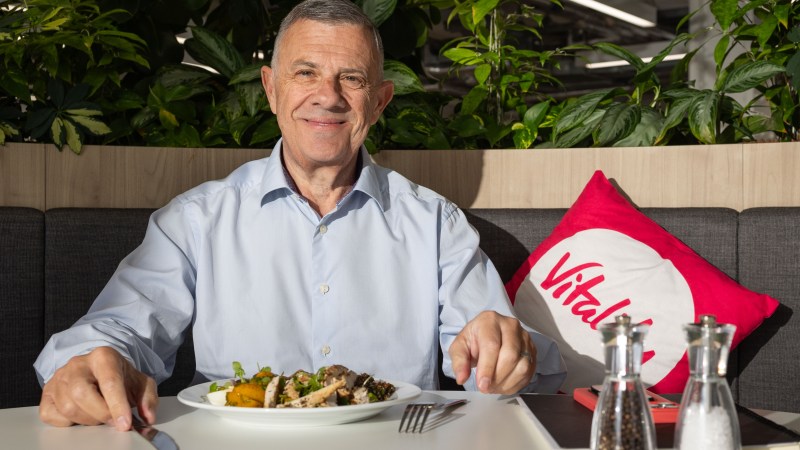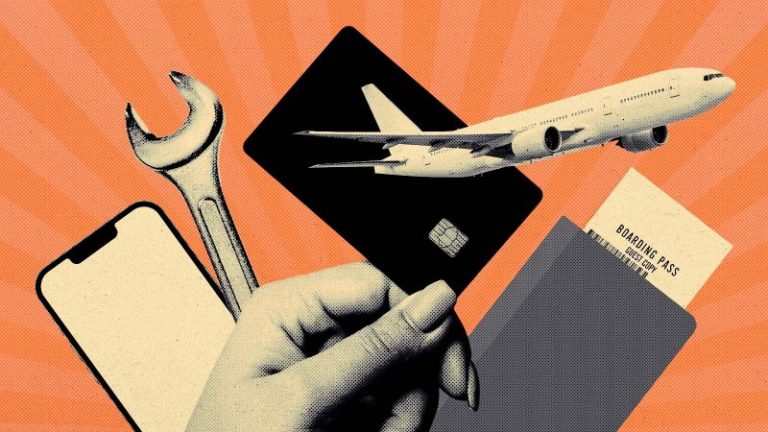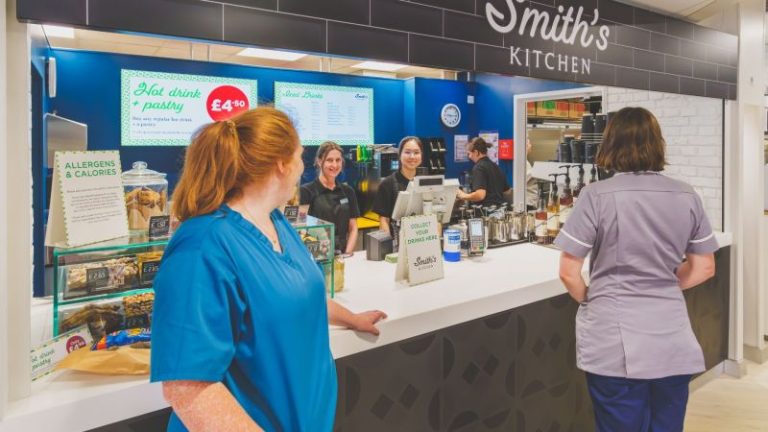Neville Koopowitz: ‘Any vices? I like an ice lolly now and then’
As one of Britain’s biggest health and life insurers, the staff canteen of Vitality serves suitably nutritious lunches.
Neville Koopowitz, Vitality’s chief executive, often joins the workforce for free meals on the fifth floor with views stretching across the River Thames and London’s South Bank.
“We were actually very particular about the catering company that we use. They understand what we stand for,” says Koopowitz, a softly spoken, diminutive South African, who has chosen chicken and yellow potato salad with dill and mustard vinaigrette, but elects not to eat any of it until after our lunch meeting. Similarly, ours is a dry lunch of tap water.
Each dish on the menu lists the calorie intake and states that adults need about 2,000kcal a day.
Vitality moved into the office off the Strand — which also appropriately has a neighbouring Virgin Active gym — last year as part of a post-pandemic shift to hybrid and hot-desk working.
Staff no longer have their own desks but, to add a human touch, along a wall of the canteen are photographs of employees with their families, interspersed with Vitality’s ambassadors, including the former England rugby star Jonny Wilkinson, sitting on a bench next to Stanley, Vitality’s mascot dachshund.
Vitality was launched as a brand in the UK in 2015 after Discovery, its Johannesburg-listed owner, took full control of a joint venture with Prudential which was first struck in 2004.
The insurer claims to have pioneered an insurance model built on “shared value” — members are incentivised to live healthier lives, benefiting the customer, insurer and society.
Does Koopowitz, 60, practise what he preaches? “Have I got any vices? Every now and then I actually quite enjoy in the evenings just having an ice lolly after dinner.”
Otherwise, he says, he only drinks beer occasionally, doesn’t eat red meat, goes to the gym twice a week, has a personal trainer near his Virginia Water home in Surrey and tries to go for a 5km run at least two to three times a week. Despite living next to Wentworth, Koopowitz is too busy to learn to play golf as well.
He once wrote that he thinks about the business “24-7, looking at emails, dialling in conference calls. My wife would say it’s not a good balance.”

Koopowitz admits he’s “not exactly the greatest example” of work-life balance, but has a “very understanding” family. “I don’t see it as a job per se. I see it as part of my life.”
He came to Britain in 2010 to lead an enlarged health business following the acquisition of Standard Life Healthcare by Pru Health, having grown up in the Eastern Cape, a deprived province of South Africa, where Nelson Mandela was also born.
His, though, was a “very privileged” upbringing, “extremely well protected” from the realities of apartheid.
After studying marketing at Rhodes University, he entered the insurance industry in Johannesburg, the “epicentre” of the country’s economy, and went on to meet Adrian Gore, 60, the founder of Discovery. He joined the business in 1996, two years after its creation, to run marketing, sales and distribution. A year later the Vitality brand and its “behavioural change programme” was launched in South Africa, “literally on a hunch because we had no data”.
“We had worked out that if we can actually get people to be healthier, it’s good for them, it’s good for us as an insurer … and society would be a beneficiary as well, for the healthier population.”
Almost three decades later, Vitality has amassed 60 million years of data across its global operations. The concept has made a “dramatic change”, he says. “The engagement levels from members as we’ve grown have actually increased.”
By way of example he points to the healthcare costs of Vitality’s “highly engaged” members being 28 per cent less than “non-engaged” members, and in its life insurance business increasing their mortality by almost five years.
“It’s not about getting an Olympic athlete to get fitter,” he says. “That doesn’t really help.” Instead it’s about encouraging the sedentary. “That’s where the biggest impact is.”
Vitality does this by rewarding customers for changing their behaviour: “Do something today and you’ll get something tomorrow.”
They include points towards a coffee at Caffé Nero and cinema tickets as well as benefits, particularly a partnership with Apple, where customers get a Smartwatch at a discount and the extent of it repaid depending on how much exercise is done.
“This incentive has worked exceptionally well. We’ve had over 250,000 Apple Watches go through our system.”
Asked whether Vitality’s model provokes criticism from some schools of thought, such as libertarians, he says: “Funnily enough, no. The interesting thing is because it’s all done with consent. And it’s amazing that when people are incentivised they’ll share their data and allow us to share, especially the tracking on the wearable technologies.”
He adds: “Our biggest detractors are our competitors.”
Vitality believes that its model can help tackle some of the biggest challenges facing the UK: reducing the burden on a stretched NHS through supporting preventive care and in turn boosting economic productivity through a healthier and less absent workforce.
He rejects the notion that private healthcare creates an unequal society, arguing that the “fundamental underlying provider of care” in the UK will remain the NHS, which he claims has “still got the best facilities”.
Where there has been a “seismic shift” in recent years has been in private demand for the provision of primary care, though. “That’s due to the demand for people wanting services like GPs and mental well-being,” he says, areas where the NHS is under particular strain.
Koopowitz also points out that more than three quarters of all health insurance in Britain is actually paid for by the employer and makes up a “large proportion” of Vitality’s customer base. “So it’s not those people who are fortunate enough to be able to afford it in their own right.”
Vitality, alongside The Times Health Commission, which it sponsored, has been calling for business leaders to do more to promote health among their employees, to help to relieve NHS pressures and boost economic productivity.
Its analysis for the commission in February said that workplaces could save the NHS £1.2 billion a year by taking on greater responsibility for improving the health of their employees, such as in reducing obesity and chronic conditions, including heart disease and diabetes.
Underlining the significance, Andy Haldane, former chief economist at the Bank of England, told the commission: “For perhaps the first time since the industrial revolution, health factors are acting as a serious headwind to UK economic growth.”
About 12 per cent of the population has private healthcare now, Koopowitz estimates, and a growing part of the market is provision by small and medium-sized employers
Since the pandemic, Vitality has also seen an increase in claims, which in turn has led it to raise premiums. Retention rates have remained stable though, he adds, cushioned by its corporate customer base. It is behind Bupa and Axa and “neck and neck” with Aviva, depending on how you measure it, he says. Across health and life insurance Vitality has 1.8 million members.
The pandemic also broke the link between a strong economy and strong private health insurance market — demand surged regardless — but Koopowitz believes this will revert to its traditional relationship.
To grow the business, this month Discovery restructured its group, enlarging Koopowitz’s role. In the short term, this is designed to boost synergies but could eventually lead to a possible stock market float.
Vitality will also continue to focus on its sports marketing. This includes Parkrun, which Koopowitz considers most important, connecting it to the grassroots, and professional sport. In 2014 it acquired the naming rights for the stadium of AFC Bournemouth, a town home to one of its three offices, alongside London and Stockport, and forming part of its 2,500 workforce.
Its sponsorship of cricket in England and Wales also dates back to 2014. It now includes The Hundred, the final of which is on Sunday at Lord’s, where colleagues will be there to watch.
Vitality UK canteen London
Chicken and yellow potato salad with dill and mustard vinaigrette — freeCreamy chicken, sundried tomato, spinach gnocchi — freeBottle of water — free
CV
Age: 60
Education: Rhodes University, Grahamstown, SA, Bachelor of Commerce, Marketing and Business
Career: 1987-1992: Old Mutual, South Africa, marketing; 1992-1996: Pride Consulting Group, managing director, employee benefits consulting; 1996-2005: Discovery Group, South Africa, group chief marketing and distribution officer and chief executive of Vitality South Africa; 2005-2010: Discovery Group, chief executive of Discovery Health; 2010: chief executive of Vitality, UK
Family: Married to Celestine, four children, four dachshunds






